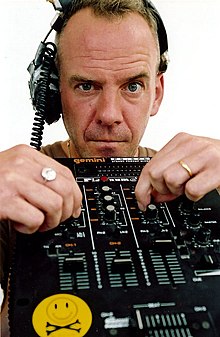Big beat
| Big beat | |
|---|---|
| Stylistic origins |
|
| Cultural origins | Early 1990s, London, England |
| Typical instruments | |
| Other topics | |
Big beat is an electronic music genre that usually uses heavy breakbeats and synthesizer-generated loops and patterns – common to acid house/techno. The term has been used by the British music industry to describe music by artists such as The Prodigy, the Chemical Brothers, Fatboy Slim, the Crystal Method, Propellerheads, Basement Jaxx and Groove Armada.[1]
Big beat achieved mainstream success during the 1990s, and achieved its critical and commercial peak between 1995 and 1999, with releases such the Chemical Brothers’ Dig Your Own Hole, The Prodigy's The Fat of the Land, and Fatboy Slim's You've Come a Long Way, Baby, before quickly declining from 2001 onwards.[2]
Style
Big beat features heavy and distorted drum beats at
Celebrated pioneers of the genre such as
History
Earlier uses of the term
The term "big beat" traces its roots to the
Premise (late 1980s)
Big Bang were a combination of everything prior and a signpost for what lay ahead.
—Big Bang.[4]
In 1989, Iain Williams from the English electronic duo
The band's sound consisted of various experimental musical elements, including heavy drum beats and synthesizer-generated loops as well as an added suggestion of European influences that at times had a trance-like quality. The band used session vocalists on all their recordings. The concept of the big beat sound was later picked up on and adapted by many club DJs and went on to become widely used by many successful musicians throughout the 1990s.Emerging (early 1990s)
The name came from our club, the Big Beat Boutique, which I'm tremendously proud of. I always thought the formula of big beat was the breakbeats of hip-hop, the energy of acid house, and the pop sensibilities of the Beatles, with a little bit of punk sensibility, all rolled into one. People like the Prodigy and the Chemical Brothers – we saw it as very similar to the Beatles and the Rolling Stones, who grew up listening to soul records and blues records and then sold an English version of it back to America.
In the early 1990s, in the midst of several popular musical subcultures, including the English



International success (1990s-early 2000s)
Big beat achieved international success in the 1990s and early 2000s, as many artists identified with the genre released hit records. During the 1990s,
The Prodigy performed at the 1997 MTV Video Music Awards[21] winning the Viewer's Choice Award there.[22] The Prodigy's song "Firestarter" went to number 30 on the Billboard Hot 100 and was a number 1 hit in many other countries, including the Czech Republic, Finland, Hungary and Norway. The Prodigy's song "Smack My Bitch Up" went to number 89 on the Billboard Hot 100.[23] The Fat of the Land by the Prodigy sold 2,600,000 copies in the United States[24] and was certified 2× platinum by the Recording Industry Association of America (RIAA).[25] The Prodigy's single "Firestarter" was certified gold by the RIAA.[26]
Fatboy Slim also achieved international success in the 1990s. His 1998 album
In August 1998,
Decline (2001–present)

The big beat scene had started to gradually decline in popularity by 2001, due to the novelty of the genre's formula fading.[36] The genre's most successful acts would further change their sound; more prominently, the Chemical Brothers releasing more material with direct house and techno characteristics (including "4x4" beats which resemble those of house and synthesizer sweeps and noises, marking a departure from their big beat sound consisting of syncopated breakbeats and hip hop samples) inspired by the success of the Gatecrasher club and the trance movement, which would reach a commercial peak between 1999 and 2002. However, big beat had left an indelible mark on popular music as an indigenous progression from rave music, bridging a divide between clubbers and indie rock fans. Without this connection, some have reasoned that it would not have reached the heights that it did, or resonated with as many listeners as it did.[37]
References
- ^ "Old Hit Won't Outgun Prodigy Disc". Miami Herald. 10 September 2004.
{{cite news}}: CS1 maint: url-status (link) - ^ Coleman, Jonny (2016-10-14). "In Defense of Big Beat, the Annoying 90s Music Genre That Snobs Love to Hate". Thump. Retrieved 2019-02-21.
- ISBN 978-83-63910-72-3.
- ^ Big Bang - About (retrieved 01/09/2021). Big Bang bio
- ^ Metropolitan (issue 132, page 9, 6 June 1989):Big Bang in Clubland – Could Big Beat be the 1989 answer to Acid House?
- ISBN 9781912587094
- ^ "The Little Big Beat Book - Rory Hoy; | Foyles Bookstore". Foyles.co.uk. Retrieved 7 January 2021.
- ^ "CLASSIC '90s: The Prodigy - 'The Fat Of The Land'". Thestudentplaylist.com. 29 June 2017. Retrieved 7 January 2021.
- ^ Metropolitan (issue 132, page 9, 6 June 1989):Big Bang in Clubland – Could Big Beat be the 1989 answer to Acid House?
- ^ Gerry, Alex (9 June 1989). "Big Bang in Clubland: Could big beat be the 1989 answer to acid house?". Metropolitan (132): 9.
- ^ "Big Bang on Apple Music". Itunes.apple.com. Retrieved 12 July 2018.
- ^ "Laurence Malice". Dmcworld.net. 8 October 2015. Retrieved 7 January 2021.
- ^ Laurence Malice talks about his music career and clubbing history in an interview with Dj Gary H live on Gaydar Radio. Part 1:Laurence Malice interview 2008 part 1
- ^ "Amazon.com: Iain Cameron Williams: Books, Biography, Blog, Audiobooks, Kindle". Amazon. Archived from the original on 2016-03-30. Retrieved 2019-09-13.
- ^ "How The Major Labels Sold 'Electronica' To America". NPR.
- ^ a b "Big Beat". Allmusic. Retrieved 26 September 2011.
- ^ "Big Beat/Chemical Beats". NciMusic. Archived from the original on 30 October 2009. Retrieved 13 January 2014.
- ^ "Newsday - the Long Island and New York City News Source". Archived from the original on 2016-12-20. Retrieved 2021-05-30.
- ^ "Official Charts Company (The Prodigy)". Official Charts Company. Retrieved 4 May 2017.
- ^ "The Prodigy – Chart history (Billboard 200)". Billboard. Archived from the original on 7 August 2018. Retrieved 4 May 2017.
- ^ Kangas, Chaz (6 September 2012). "The 1997 Edition Was the Best MTV Video Music Awards". LA Weekly. Retrieved 4 May 2017.
- ^ "VMA 1997 – MTV Video Music Awards". MTV. Retrieved 4 May 2017.
- ^ "The Prodigy – Chart history (The Hot 100)". Billboard. Archived from the original on 9 May 2018. Retrieved 4 May 2017.
- ^ "36ask". Billboard. Retrieved 4 May 2017.
- ^ "American album certifications – The Prodigy – The Fat of the Land". Recording Industry Association of America.
- ^ "American single certifications – The Prodigy – Firestarter". Recording Industry Association of America.
- ^ "American album certifications – Fatboy Slim – You've Come a Long Way, Baby". Recording Industry Association of America.
- ^ "Fatboy Slim Chart History (Hot 100)". Billboard. Retrieved August 6, 2018.
- ^ "Fatboy Slim Chart History (Mainstream Top 40)". Billboard. Retrieved August 6, 2018.
- ^ "The Crystal Method – Chart history (Dance Club Songs)". Billboard. Archived from the original on 10 May 2018. Retrieved 4 May 2017.
- ^ "American album certifications – The Chemical Brothers – Dig Your Own Hole". Recording Industry Association of America.
- ^ a b Basham, David (February 7, 2002). "Got Charts? Bean, Bleek & Beatles Synch Up Soundtracks". MTV. Retrieved August 6, 2018.
- ^ "The Chemical Brothers Chart History". Billboard. Retrieved August 6, 2018.
- ^ "American album certifications – Soundtrack – The Matrix". Recording Industry Association of America.
- ^ Basham, David (February 7, 2002). "Got Charts? Beans, Bleek & Beatles Synch Up Soundtracks". MTV. Retrieved February 21, 2020.
- ^ Damian Harris (9 April 2008). "Big beat: creating a dancefloor monster". The Guardian. Retrieved 26 September 2011.
- ISBN 9780316741118.
Further reading
- The Little Big Beat Book by Rory Hoy, published 10/09/2018, by New Haven Publishing Ltd, ISBN 9781912587094- The book outlines the history of Big Beat as a musical genre and contains 120 interviews with bands and musicians that helped create and produce Big Beat music.
- The Story of Big Beat: Bookazine Paperback – 30 Jul 2019 by Rory Hoy, New Haven Publishing Ltd (30 July 2019), ISBN 978-1949515091
External links
- Big beat at AllMusic
